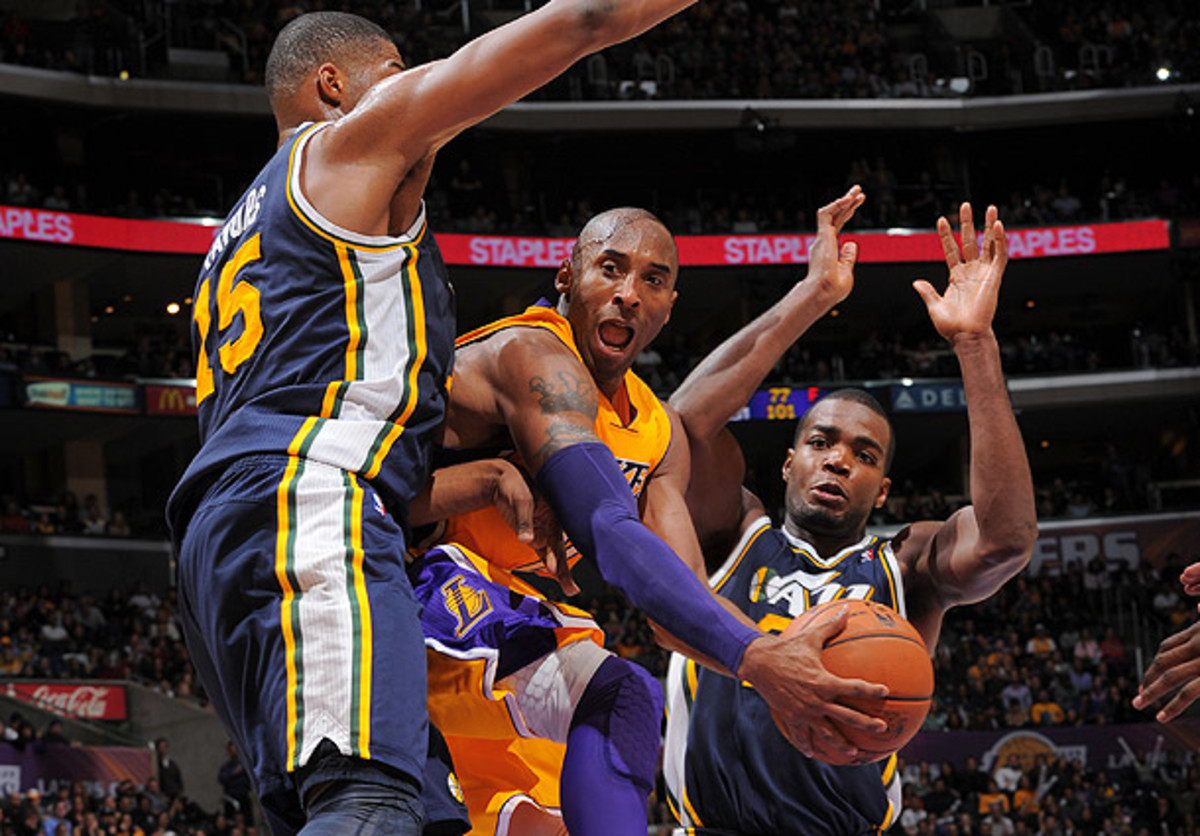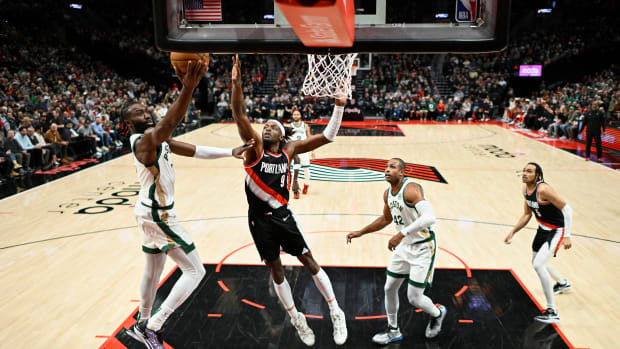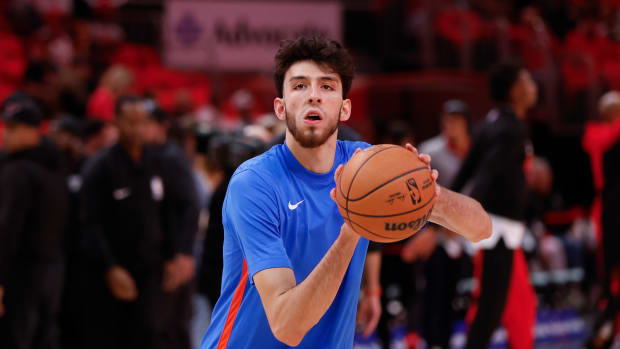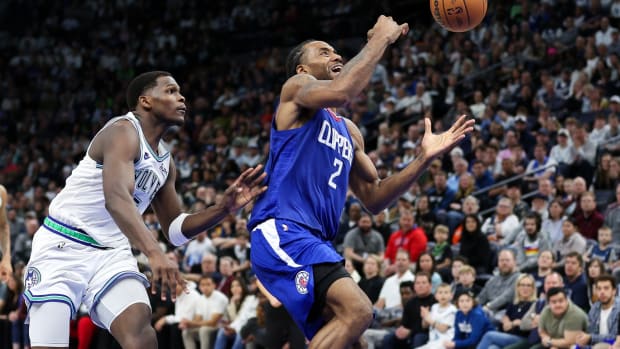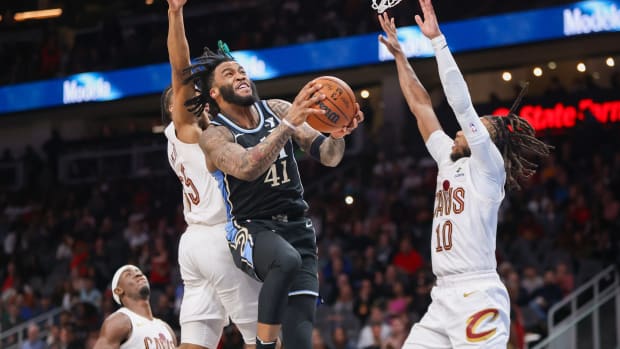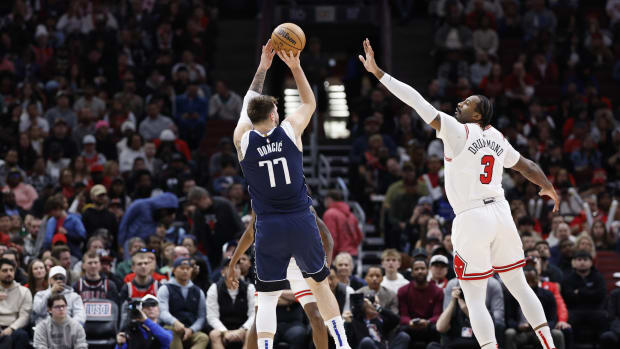Lakers, Jazz, Mavericks locked in race for No. 8 seed in Western Conference
By virtue of a tie-breaker, Kobe Bryant (center) and the Lakers will need to finish with a better record than the Jazz to qualify for the playoffs. (Andrew D. Bernstein/NBAE via Getty Images)
By Ben Golliver
With the calendar turning to April and the regular season entering its final 17-day stretch, the Lakers have made significant progress toward delivering on Kobe Bryant's playoff guarantee from late February. At that time, statistical models from Basketball-Reference.com and ESPN.com gave the Lakers between a one-in-four and one-in-three shot to reach the postseason. Now, the Lakers' chances amount to a coin flip.
A coin flip is far from a guarantee, and the Lakers' last month has featured cause for both promise and concern. The same can be said for their remaining schedule. With eight games left, the Lakers (38-36) entered Monday tied for eighth place in the Western Conference with the Jazz (38-36), who have steadied a once-sinking ship, and sit just 1½ games ahead of the hard-charging Mavericks (36-37). Because Utah holds head-to-head tiebreakers over both teams, the Lakers and Mavericks will need to finish with a better record than the Jazz to qualify for the postseason.
What's in store until the regular season ends on April 17 and what does it mean for Bryant's guarantee? Let's take a look.
How did they get here?
Quickly, the last month has seen four major developments in the chase for the No. 8 seed.
First, the Rockets, as anticipated, rode a significantly easier schedule to build a 2½-game lead over the Jazz and Lakers, all but securing their spot in the postseason. Second, the Mavericks resuscitated their season by going 10-4 in their last 14 games. They have a chance to get to .500 for the first time since early December when they face the Lakers on Tuesday.
Third, the Jazz fell on hard times after the trade deadline, going 4-12 before running off four straight wins over the last week. Fourth, and finally, the Lakers nearly accomplished the inverse of the Jazz's struggles, going 11-3 after the All-Star break before dropping four of their last six games.
Those four developments together have tightened this into a three-team race for the last truly available playoff spot in either conference. The chart below compares the three teams’ rankings for offensive efficiency, defensive efficiency and MAR (average point differential), while listing their remaining strength of schedule (average winning percentage of opponents left to play). The teams’ playoff odds in both the Basketball-Reference.com and ESPN.com models are listed at the right.
Here, we have our first example of the "both sides of the coin" paradigm facing the Lakers. On one hand, the Lakers continue to post better efficiency numbers on both sides of the ball than either the Jazz or the Mavericks, and their average point differential continues to outpace both teams, too. The Lakers' +0.82 average margin of victory actually outpaces five playoff teams, while the Jazz's (-0.22) and the Mavericks' (-0.79) only top that of the Bucks. If those top-down numbers were the only information available, L.A. would be the narrow, but clear pick.
On the other hand, the Lakers' remaining schedule is the toughest of the three, based on quality of their opponents. What's the difference between the Lakers' schedule and the Mavericks' schedule? A 56 percent winning percentage would be worth the No. 5 seed in the East and the No. 7 seed in the West; a 49 percent winning percentage would be worth the No. 8 seed in the East and the No. 11 seed in the West. That difference suggests the Mavericks' 1½-game deficit appears larger right now than it could prove to be over the next few weeks.
Momentum?
We can say one thing about all three teams in this mix: They are hovering around .500 because the only consistency they've enjoyed this season is inconsistency. Can any of these teams make legitimate claims to momentum? Can all of them?
Here's a chart that compares the three teams' winning percentages throughout this season (win percentage on the left, game log along the bottom).
The biggest takeaway from the visual is the Mavericks' steady progress during the second half of the season. Dirk Nowitzki has cranked up his scoring and rebounding numbers over the last two months -- he averaged 20 points and 7.6 rebounds per game in March -- and Mike James has stepped in to provide a more veteran touch at the point guard position.
The second takeaway is the Lakers' rise, which culminated in their eclipsing the Jazz for a brief period over the last week or two before falling back into their current situation. It's easier to see that trend by calling out just the last 20 games. (Note: The Lakers and Jazz are in the same position at the far end of the right chart, even though the Jazz's purple line displays on top of the Lakers' green.)
This chart should really provoke indigestion for Lakers' fans. L.A.'s lead over Utah -- a margin now eliminated -- was nearly pushed to the point where this wouldn't even be a race. Three losses stand out: a tight loss to the Hawks on March 13 in which Bryant was injured during a potential game-tying jumper; a laid egg to the Suns, one of the worst teams in the league, on March 18; and a home loss to the Wizards on March 22 that led to a Mike D'Antoni postgame explosion. Had those three gone the other way, the Lakers would be in the No. 7 seed in a race with the Rockets and Warriors for the 6-7-8 spots. Instead, they're on the outside looking in with a tougher stretch of the schedule to navigate.
All three coaches can make momentum arguments to their respective locker rooms. Utah's Tyrone Corbin can point to his team's four straight wins, ignoring the month-plus that preceded them. D'Antoni can point to a 9-6 March that could have been, as noted, a 12-3 month. Dallas' Rick Carlisle can point to almost any stretch since February, taking particular satisfaction from recent nail-biting victories over the Clippers and Bulls.
The Schedules
The following chart compares the remaining games for the Jazz, Lakers and Mavericks, noting how many projected playoff and lottery opponents are on the schedule. Remaining home games and away games are also noted, as is remaining strength of schedule (average winning percentage of opponents remaining).
Here's a game-by-game rundown of the three teams' schedules.
vs. Blazers
vs. Nuggets
vs. Hornets
at Warriors
vs. Thunder
vs. Timberwolves
at Timberwolves
at Grizzlies
vs. Mavericks
vs. Grizzlies
at Clippers
vs. Hornets
at Blazers
vs. Warriors
vs. Spurs
vs. Rockets
at Lakers
at Nuggets
at Kings
at Blazers
vs. Suns
vs. Nuggets
at Hornets
vs. Grizzlies
vs. Hornets
Here, again, the Lakers have meaningful circumstances to consider on both sides of the coin. Optimistically, the Lakers play six home games -- seven if you include their game against the Clippers at the Staples Center -- and one of their two road games, at Portland, is incredibly winnable given the Blazers' recent slide, youth and lack of depth.
Pessimistically, the Lakers do play more quality teams than the Jazz and Mavericks and they close with three playoff teams. That could prove to be either a gift or a curse: If the Warriors, Spurs and/or Rockets are in a position to rest their players during the last week of the season, that could be a game-changer for this race. If not, and they have their own meaningful playoff implications to play for, look out.
The tiebreaker with Utah makes the task in front of L.A. quite clear. The Jazz would seem to have at least four clear wins remaining on their schedule (Portland, New Orleans, Minnesota twice). If they win those four and no others, they would finish 42-40, meaning the Lakers need to get to 43 wins to qualify for the postseason.
Finding five wins for L.A. in its next eight games isn't impossible, but it requires the Lakers handling business against all of their weaker competition -- which includes the Mavericks -- and prevailing against at least two playoff teams. But if Utah handles those four games against also-rans and can find just one win in its games against the Nuggets, Warriors, Thunder and Grizzlies, the Lakers would have to go 6-2 to make the playoffs.
The Mavericks' game against the Lakers on Tuesday is looking like a must-win affair. (Danny Bollinger/NBAE via Getty Images)
These same circumstances account for the Mavericks' long-shot odds in the computer simulations. To reach 43 wins, the Mavericks needs to close 7-2. That's a real possibility, given their six games against teams currently headed for the lottery, but it turns Tuesday's game against the Lakers into a veritable must-win. Drop that one and Dallas is going to need a lot of help.
External Factors
The biggest variable -- which can't yet be accounted for -- is who will be playing their key players through the end of the season. The Spurs have a 1½-game lead over the Thunder, giving both teams reason to continue pushing, but that could be a moot point by the time L.A. plays host San Antonio on April 14.
The Grizzlies are locked in a tight 3-4-5 race with the Nuggets and Clippers. One game separates the three teams, but that could change by the time Dallas plays Memphis on April 15 and/or when Utah plays Memphis in its regular-season finale on April 17.
Houston is squarely in the No. 7 slot. If that continues, what motivation do the Rockets have to play their key players -- including James Harden, who is dealing with a foot injury -- during their regular-season finale against the Lakers? Same thing for the Warriors, who are solidly the No. 6 seed. Will Stephen Curry and David Lee already be in rest mode -- or restricted-minutes mode -- by the time the Lakers meet them in Los Angeles on April 12?
Meanwhile, the Jazz, Lakers and Mavericks all have injuries worth mentioning: Utah lost reserve center Enes Kanter indefinitely to a shoulder dislocation, L.A. lost starting forward Metta World Peace to season-ending knee surgery and Dallas guard O.J. Mayo is playing through a shoulder injury.
World Peace's injury clearly looms largest. His antics and reputation tend to overshadow how important he is to the Lakers: He appeared in all but one game this season before his knee injury, playing more minutes than every Laker except Bryant. According to NBA.com, World Peace leads the Lakers with a +4.7 net rating and a +2.5 plus/minus.
Notably, the Lakers' defense has been more than five points per 100 possessions worse this season when he's not on the court. That shouldn't be a surprise; D'Antoni just doesn't have an available perimeter stopper to turn to with World Peace sidelined. In the three games since World Peace went down, the Lakers have conceded an average of 109.3 points to teams with bottom-16 offensive efficiency ratings. Six of their eight remaining opponents have top-14 offensive efficiency ratings, including four in the top 10.
Can The Lakers Deliver?
As with any coin-flip scenario, especially one with as-yet-unpredictable external factors hanging out there, one guess is as good as another.
A plausible Lakers path to the playoffs looks like this: beat Dallas; take care of the Hornets and Blazers; and go 3-for-3 in their final homestand against the Warriors, Spurs and Rockets, with strategic resting by their opponents helping push them to a 6-2 finish and 44 wins. Utah would need to go 6-2 to stop L.A. from advancing in that scenario.
Reading that back, it sounds quite daunting for the Lakers, doesn't it? You can talk yourself into it (home-court advantage, opponents with nothing to play for, season-on-the-line urgency) just as easily as you can talk yourself out of it (World Peace injury, defensive struggles, general inconsistency).
A plausible Mavericks path to the playoffs looks similarly tricky: beat the Lakers; take care of business against the Kings, Blazers and Suns; split with the Nuggets; beat the Grizzlies; and sweep the Hornets to finish 8-1 and reach 44 wins. The Jazz would need to go 6-2 to stop Dallas from advancing in that scenario.
That brings us to the easiest way to sum up the state of this race: Utah needs the least help. Four Jazz wins could be enough, five Jazz wins should be enough and six Jazz wins almost certainly will be enough. That doesn't sound all that terrible, especially with four very favorable games remaining.






























